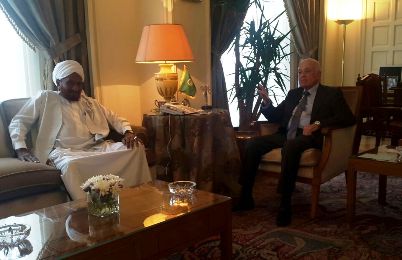Opposition leader calls on Arab League to support Sudan dialogue process
April 23, 2015 (KHARTOUM) – The leader of the opposition National Umma Party, (NUP) has called on the Arab League (AL) to press the Sudanese government to resume national dialogue following the end of general elections.

This development intervenes as Sudanese president Omer al-Basjir agreed with his Egyptian counterpart Abdel Fattah al-Sissi to develop bilateral relations and to work together to settle Nile water issue and the Libyan crisis.
NUP president Sadiq al-Mahdi met on Thursday with AL secretary-general Nabil Elaraby where he explained the Sudanese opposition position on the need to end the armed conflict in South Kordofan and Blue Nile states and Darfur in a national conference including democratic reforms.
“We briefed Elaraby on the current developments in Sudan and the (recent) elections that took place in the country, ” said al-Mahdi following his meeting with the Arab league chief, adding the vote delayed the national dialogue process.
“[We] look forward to seeing any talk about a national dialogue in Sudan be based on a review of the mechanism entrusted with process, and we explained our position to the AL secretary-general as representatives of the forces of the Sudanese future and what we mean by this new framework,” he said.
The Sudanese opposition boycotted the presidential and parliamentary elections pointing to the continuation of armed conflicts in the country and the lack of freedoms. But, the opposition and rebel groups accepted to participate in a national dialogue preparatory meeting to be organised by the African Union while the ruling National Congress Party (NCP) rejected to meet the opposition before the elections.
Al Mahdi told reporters that the revival of the national dialogue requires a fundamental review of the current process and the establishment of a new mechanism .
He pointed that among the national requirements there are: the implementation of confidence building measures, a declaration of principles indicating the purpose of the process is to achieve a just peace and comprehensive democratic transformation in the Sudan.
The former prime minister further said there should be a new decision form the Peace and Security Council of the African Union giving the mediation broader powers and to seek the support of the United Nation Security Council .
Earlier this month in a statement issued in Khartoum, the Sudan Call forces emphasised on the need to open humanitarian access to the needy in the conflict areas and to ensure political freedoms. They also called for a independent mechanism to administer the dialogue process.
NEUTRAL ARAB ROLE
Different reports said that Arab League countries would undertake a campaign to break the diplomatic isolation of the regime and to ease its strained relations with Western countries.
During the meeting with Elabarby, al-Mahdi said they requested that the Arab League adopt a neutral stance, and to not support the government repressive policy against the opposition forces.
We pointed to “the need for a neutral Arab League’s position and to not support a side against another in Sudan. (The AU) must coordinate its position with the African Union, and there should be communication and coordination about what should be done in the Sudan,” he said.
The Arab press, particularly in the Gulf countries, remained open until recently to the opposition news and opinion articles criticising Khartoum policy. Also, they tolerated opposition activities and meetings among the important Sudanese Diaspora there.
But several indications suggest that things would no long remain like before.
MEETING WITH SUDANESE ARMY CHIEF
Elaraby also met with the Sudanese army’s chief of staff, Gen. Mustafa Osman Obeid, on Thursday to discuss Sudan’s participation in the joint Arab force.
Following the end of a summit held in the resort town of Sharm el-Sheikh in March, Arab leaders agreed to form a joint military force and set a four-month time frame for the 22-member Arab League to decide on the composition and rules of engagement of the joint force.
Sudanese ambassador to Egypt Abdel-Mahmood Abdel-Haleem said the meeting discussed Sudan participation in the Arab force adding that his country joined a high level committee designed to set the rules of its composition.
The discussions have to decide if it would be a permanent force, where it would be based and its command structure.
A final communiqué released after the Arab summit provides that the interventions of the joint force would be dictated by the “challenges that threaten safety and security of the member states, based on request of the concerned country”.
(ST)
